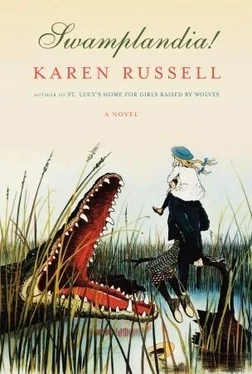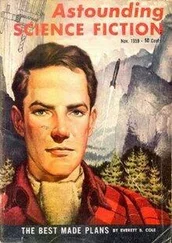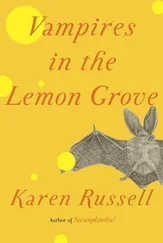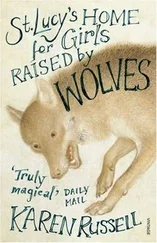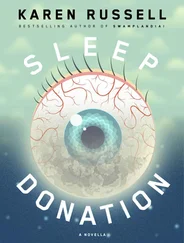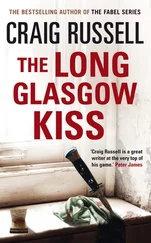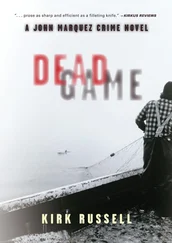I touched my throat. Personally, I had always considered the story of Mama Weeds a little silly. I had rambled all over the islands and I never once saw a ghost dog or a weedy lady in a lake. Kiwi was always telling me that Chief Bigtree’s swamp lore was uniquely stupid and that I didn’t have to believe it — if the swamp boomers had killed Midnight, he said, assuming a woman named Midnight Drouet had indeed existed, then she was dead and that was that.
But what if I was looking at an aerial cemetery? What if these clothes were Mama Weeds’s collection? In the vacant spots where no clothes were hanging, the line seemed to disappear against the blue sky. Your eyes could pick it up again further down the trees as tines of light. Far down in the west I could see five or six buzzards, spaced out on the clothesline like mainland pigeons on a telephone wire. Below them, some family’s checkered tablecloth made half a bubble on the wind.
I nearly jumped out of my skin; I saw a jacket that I recognized. It was one of the articles closest to me, pinned a few feet from where I was standing. A jacket that was so old and sun-faded that it had gone cuticle white — a WPA jacket, Bigtree museum quality, the Chief would have gone berserk for it. The shirt beside it had checks running in a canary net over the fabric; the last time I saw this garment, Osceola had been wearing it in our kitchen. Initials were sewn in cursive on the pocket — L.T. — in fat raspberry thread. Then a brighter purple caught my eye, an amethyst, the same shade as the ribbon around my wrist, and I saw that Ossie’s favorite skirt was hanging one line over. It was the clothing she’d been wearing when she left to marry Louis T.
I was pulling Ossie’s skirt from the line when a woman appeared around the side of the house. The occupant! I started to open my mouth to call for help, stopped.
She was huge — not fat so much as absolutely solid. She might have seemed ugly in a run-of-the-mill way to me if she’d been a tourist on our boardwalk. I had seen plenty of out-of-the-way women who looked like her before; she wasn’t covered in pigweed, there was no panting hound named Luke beside her. She had big dimpled arms, a dizzying profusion of gray-and-black hair. She was wearing a dress that looked ready to burst off her. It was too delicate for her, with its short puffed sleeves and its color, a faded yellow with tiny heart-shaped white flowers. My mother used to wear a dress like that, with a very similar look. No, I thought with a slow and brain-penetrating chill, she used to wear this dress. I was certain now that I was staring at Mama Weeds.
“What are you doing here, girl?”
She looked like a woman but I wouldn’t be fooled. I saw my mother’s dress hanging off her and I knew this creature was a thief, a monster.
“How did you get these things?” I yelled. “What did you do with my sister?”
“Your sister!”
And then her big hand was on my shoulder and I ducked away from her. Her breath felt moist on my cheeks. She grabbed at me and I raked my nails down her arm; she screamed and I twisted away.
“What on God’s earth are you talking about? Where’s your mother, girl? Are you out here alone? You got a sister with you?”
At the mention of my mother I shuddered out of her grasp. This creature was teasing me. “You can’t have her!” I screamed. I tried to wrench the dress off her.
Our eyes met. I looked up, still swaying from my fistfuls of the stolen dress. What I saw inside them was all landscape: no pupil or colored hoop of iris but the great swamp — the islands, the saw-grass prairies. Long grasses seemed to push onward for miles inside the depths of her eyes. Inside each oval I saw a world of saw grass and no people. Believe me — I know how that must sound. But I stood there and I watched as feathery clouds blew from her left eye behind the bridge of her nose and appeared again in her right socket. I saw a nothing that rolled forward forcefully forever. There was nobody in the ether of either white sky.
I heard the wind on the pond all around us, a deep clay smell rising from her skin. When she blinked again, her eyes looked black and oily, ordinary. For years I’ve wondered if this person I met was only a woman.
“You’re a monster,” I said quietly. “I wish you’d give me back my mother.”
“Girl, you are not making a lick of sense now …”
“Get away from me!” I screamed. “You can’t have these! My sister is alive. ” I used the Bigtree maneuvers to get away from her, dodging the hand that snaked out for me as quickly as I’d leap away from a Seth’s thrashing tail, lunging at a spot above her calf where the dress hung loose. I had to get my family away from her.
“What are you talking about, your sister? You need to calm down. My God, you look like some rabid animal! How old are you, girl? How did you get way out here?”
Her voice made me think of the Bird Man’s voice, bright with a false kindness. I held Osceola’s and Louis’s clothing and began to back away from her, a snarl clawing its way up my throat. I had rescued their clothes and a two-inch triangle of my mother’s dress.
“Hey, girl!” the monster shouted. “You need help! Girl, get back here!”
When I got to a small drift slough I drank more of the water. I ate saw-grass buds, peeled sticks between my teeth. No longer did I think that drinking the water was a bad idea — I didn’t have any ideas left in my head, I was all clouds. A burning thirst was unraveling my stitching from the inside. I held the clothing to my chest and tried in a fuzzy way to figure out what this jumble of fabrics meant — that my sister was alive out here? That my sister was dead? I clutched what I’d managed to salvage: a small ball. After my battle with Mama Weeds I was tired, tired. Thinking felt like lifting spadefuls of heavy dirt.
As I walked I kept seeing the monster’s face: the spheres of grass blown inward and split as easily as bubbles. Her eyes as pure holes. I felt I’d glimpsed then what would happen at the world’s end when the stars cracked open. It was not a picture of heaven this Mama Weeds fixed on me like a gaze but something much bigger: a breaking apart, a mindcrush, a red smear pulsing where two black tunnels met; I found I actually couldn’t think about it.
I hadn’t traveled very far at all when I saw signs of a human presence. Cracked sticks, an empty plastic bottle still dewed with juice. This made sense, I thought, remembering the woman and her nearby shack. But then I saw a black feather, and another. Tiny feathers clinging to a gray net of moss on a trunk.
It’s not him , I told myself. There are about a thousand species of birds in our swamp. I didn’t run now but pushed forward through the thickets very quickly. I was still hugging what I’d saved from the line. This little yellow triangle of flowers from Mom’s old dress. When I looked at it now I wasn’t so sure that it had belonged to her dress at all — anyhow, the scrap was so tiny that it just had half a flower on it, the pattern didn’t even get a chance to repeat itself. I slid it into one fist and held on to it, punched against the trunks.
In the east the sky throbbed with recurring heat lightning. It was some o’clock. I put on Louis Thanksgiving’s jacket, which reached below the crusts of my knees; I unscrolled the old veil that I found in his pocket and tied it around my face. I did this for pragmatic reasons: an afternoon thundershower was sweeping the prairie and the bugs were all over. I figured the veil would work just as well for me as it had for the early Florida dredgemen to keep the bugs out of my nose and mouth. Out here the mosquitoes were after me for red gallons — you could see clouds of them hanging above the grassland. I’m sure they are still out there hovering like that, like tiny particles of an old, dissolved appetite, something prehistoric and very scary that saturates the air of that swamp. A force that could drain you in sips without ever knowing what you had been, or seeing your face.
Читать дальше
